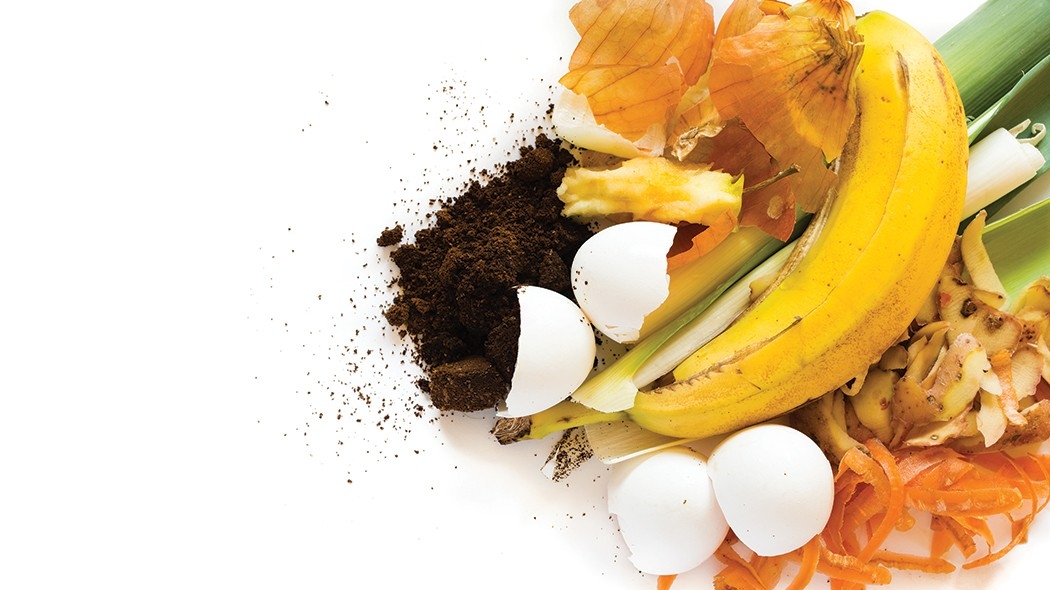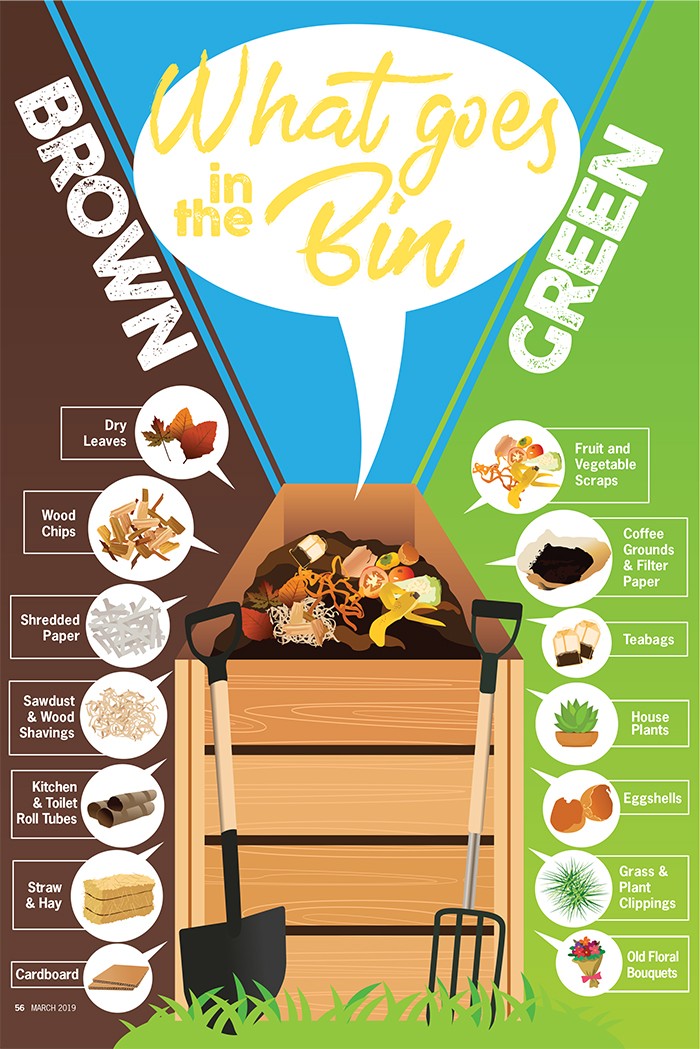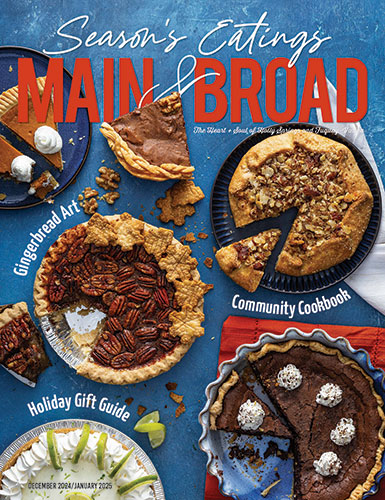Once we thought nothing of tossing aluminum cans or glass bottles in the trash, but now most of us thoughtfully sort our paper, metal and plastic.
Lately, residents are turning that same mindfulness to recycling their food waste. By allowing fruit, vegetables and leaves to decompose naturally, the organic materials become a rich soil amendment called compost.
“People are just more conscious of what they’re throwing away,” said Sarah Justice, environmental outreach coordinator with the Town of Cary.
More than a quarter of the area’s household waste is yard trimmings and food scraps, according to the Wake County website. Justice puts that figure closer to 70 percent.
“A lot of people look at all that information and think, ‘Composting is just the right thing to do.’ And if you can make it simple and accessible and show people the personal benefits that they get from it, then they’re likely to try it,” she said.
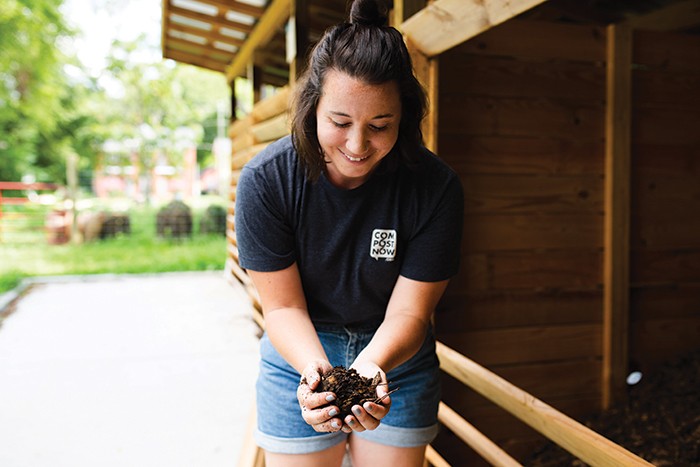
Kat Nigro from CompostNow shows the texture of the finished compost that the company provides to members and garden partners. Photo courtesy of Mike Schulte.
During several composting workshops that Justice leads in the spring and fall, she makes the connection between composting, healthy soil and home gardening.
“Of course, we want you to compost because it’s the right thing to do for our solid waste system and the environment,” said Justice, “but I also think there’s a huge quality of life component to growing your own food and flowers and having a beautiful lawn.”
The most common method is pile composting, which involves layering greens and browns in an enclosure or purchased bin located in the back yard. Some homeowners’ associations have guidelines on outdoor compost bins, so it’s worth checking the community rules before beginning this project.
Every spring, discount compost bins are available online from Wake County and the Town of Cary. Justice says the town usually sells between 200 and 300 bins every year, a figure that she interprets as a steady interest in composting.
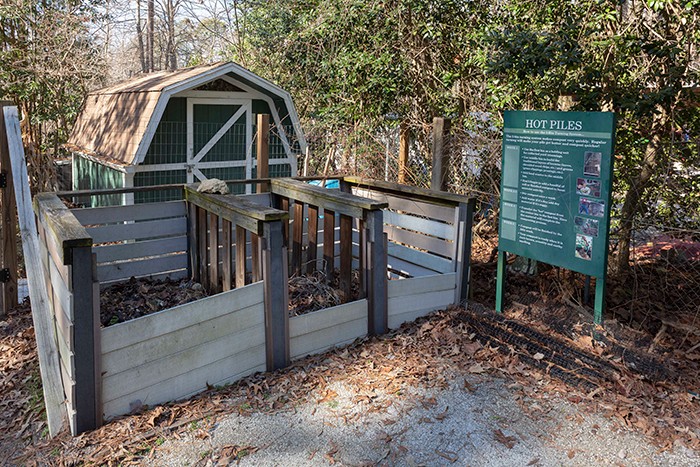
The Compost Education Center at Bond Park in Cary is open year-round. During the summer, experts from the Town of Cary answer gardening and composting questions at the center from 10-11 a.m. on Wednesdays.
“Cary may be a unique culture because we are a community of people who love their lawns, a community of people who are engaged in the environment in a really deep way,” she said. “I do see the culture shifting, and I see the demand increasing.”
For apartment dwellers or those without a yard, Justice suggests vermicomposting. With this method, kitchen scraps are fed to hungry worms that live in a plastic tub. Depending on its size, the worm habitat can be stashed in a utility closet or under the kitchen sink.
Justice admits that there are some who are turned off by the whole idea of do-it-yourself composting, but who still want to do the right thing. For those people, a composting service like CompostNow is a good alternative.
“For the residential program, we made it really easy, clean and convenient, because we felt those were three pain points that people had with composting on their own,” said Kat Nigro, head of marketing and engagement at CompostNow.
For about $29 a month, residential clients get a four-gallon bin to fill with kitchen scraps and other compostable materials. CompostNow picks the bin up once a week and replaces it with a clean bin. The company also offers plans for businesses, schools and restaurants.
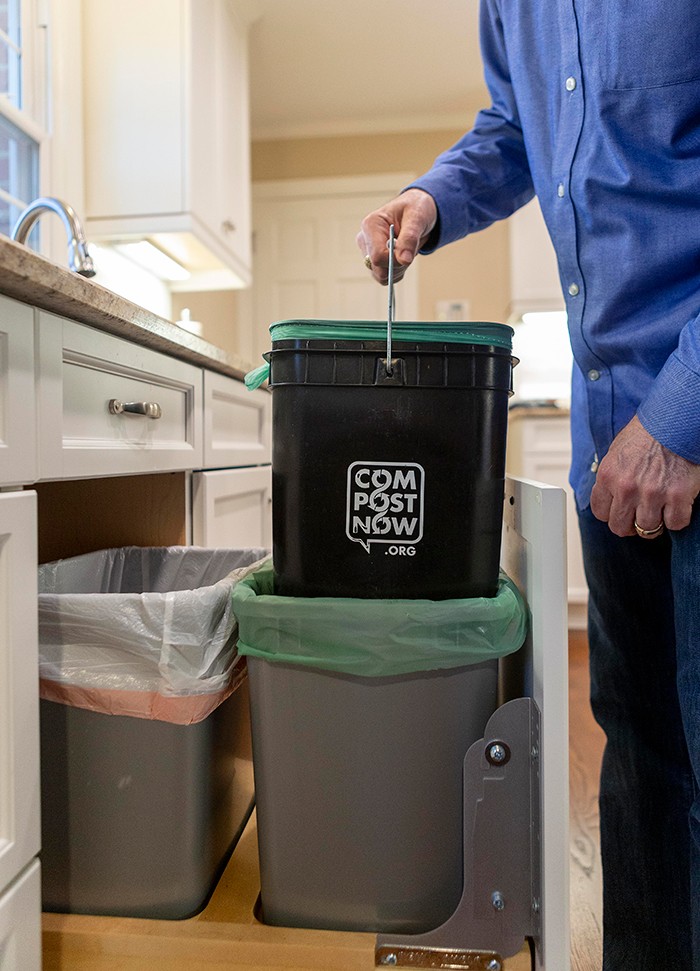
CompostNow aims to make composting easy and convenient for its members. Kat Nigro, a spokesperson, says consumers can fit about 10 pounds of compostable material in the four-gallon bin, which can be tucked next to the trash bin or stashed under the sink.
Because the company partners with Brooks Contracting, a local commercial composting company, all sorts of unlikely items can be composted, Nigro says. Meat and bones, paper plates and coffee cups, even last night’s leftovers can go in the bin.
For every 10 pounds of organic material, subscribers can receive five pounds of compost for their yard. If members don’t want the finished compost, they can donate it to a local community garden like the Gracious Harvest Community Garden in downtown Cary or the student garden at Northwoods Elementary School.
Since 2011, when the service launched in the Triangle, more than 9.5 million pounds of organic material have been diverted from landfills, and more than 4.5 million pounds of compost have been created for local gardens, the company reports. CompostNow also operates in Asheville, Atlanta and Charleston, S.C.
“People are recognizing the need for composting. They’re seeing our waste management system is broken, and they’re wanting to do something on an individual level to make an impact on their community,” said Nigro.
“A lot of people feel overwhelmed with all the stuff we throw away and a little helpless. By choosing to compost, they are able to make a huge impact by doing such a simple thing.”
How to Compost
The “add-as-you-go” or continuous pile method allows organic materials to be added as they become available. It takes a little longer for your kitchen scraps to turn into lovely compost, but the effort is minimal once the pile is established.
While you can compost in an open pile or bin you build yourself, the easiest way to start composting is with a purchased bin. Triangle residents can order a discounted bin through the Town of Cary or Wake County.
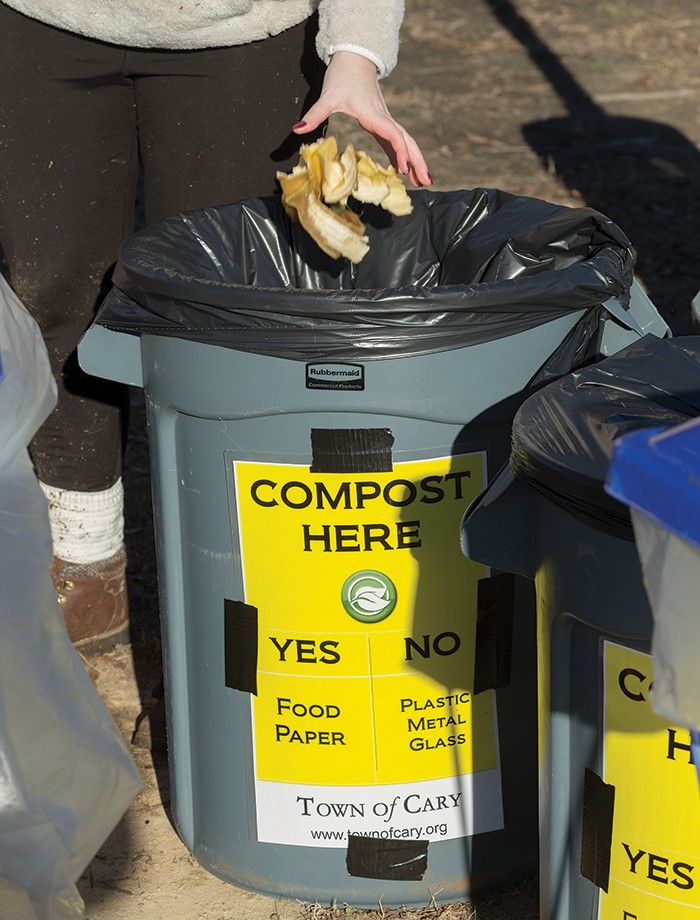
At a recent Town of Cary event at Good Hope Farm, all the paper and food scraps were collected to be composted. At many other town events, like the annual veterans luncheon, all of the disposable flatware, plates and cups are composted along with the food scraps.
How to store it
Place your compost bin in a flat, open space that you can get to easily but isn’t right next to your house or garage. A shady spot is ideal, so the compost doesn’t dry out as quickly in the hot North Carolina summers.
Load it
Add four or five inches of brown materials to the bottom of your bin, and water thoroughly. Sprinkle with a handful of soil to introduce more microorganisms.
Keep it balanced
Add a layer of green materials, and finish with another layer of brown materials. Alternate layers of greens and browns as they become available, but always cover food scraps with a brown layer. This keeps away flies and other pests; it also reduces unpleasant odors.
Air it out
Your compost pile also needs air and water for the microorganisms to do their thing. Once a week, turn the contents of your bin with a digging fork or shovel. If this isn’t practical, try poking it with a broom handle or aerating device.
When you are turning the pile, notice how wet it is. The organic material should be damp — like a wrung-out sponge. Add water if it’s too dry, or add some brown materials if it’s too wet.
Get results
After a few months, you will have finished compost at the bottom of your bin, ready for your flower beds. Most commercial bins have trap doors so you can remove the finished compost and leave the unfinished compost in the bin.
Sources: homecompostingmadeeasy.com, N.C. Cooperative Extension Service
Resources:
- “Home Composting Made Easy,” by Christopher Forrest McDowell and Tricia Clark-McDowell. homecompostingmadeeasy.com/index.html
- N.C. Cooperative Extension Service. composting.ces.ncsu.edu
- Compost giveaway workshops. Spring classes are March 7-9, at Good Hope Farm in Cary, registration is required. townofcary.org, search “compost giveaway workshops”
- Discount compost bins. Open to all Triangle residents, Cary’s 2021 sale of compost bins is going on now, through April 30. townofcary.org, search “online compost bin sales”. Wake County’s annual bin sale is May 1-31. wakegov.com
- CompostNow picks up compostable materials and returns finished compost to you. compostnow.org
Source: Sarah Justice, Town of Cary
What to Compost
- Animal manure from chickens or other herbivores
- Cardboard rolls, cereal boxes, brown paper bags
- Coffee grounds and filters
- Cotton and wool rags
- Dryer and vacuum cleaner lint
- Eggshells
- Fireplace ashes
- Fruits and vegetables
- Grass clippings, yard trimmings
- Hair and fur
- Hay and straw
- Houseplants
- Leaves
- Nut shells
- Paper towels
- Seaweed (rinse off salt water)
- Shredded newspaper
- Shredded bills, bank statements, junk mail and office paper
- Tea and tea bags
- Wood chips, sawdust, toothpicks, burnt matches
What not to Compost
- Black walnut tree leaves or twigs (releases substances that might be harmful to plants)
- Coal or charcoal ash (contains substances harmful to plants)
- Dairy products (creates odor problems and attracts pests)
- Diseased or insect-ridden plants (diseases or insects might spread)
- Fats, grease, lard or oils (creates odor problems and attracts pests)
- Meat, fish, egg or poultry scraps (creates odor problems and attracts pests)
- Pet wastes (dog or cat feces, cat litter) (might contain parasites or germs)
- Yard trimmings treated with pesticides (might kill composting organisms)
Source: The EPA, www.epa.gov/recycle/composting-home
Why Compost
- Composting saves money, avoiding the need to buy compost to improve soil.
- Using compost also reduces the need for commercial herbicides and fertilizers.
- Adding compost to the soil helps it absorb and retain more water, preventing erosion.
- Composting cuts the amount of trash your household generates and sends to the landfill.
- When organic material decomposes in the landfill, methane is generated. Composting doesn’t produce methane, a powerful greenhouse gas.
- Composting lowers your carbon footprint.
- Explore Carrboro: Small-town Southern Meets Hippie Chic
- Making a Splash
- Discover Manteo’s Timeless Appeal
- Nonprofit Spotlight: BikeWalk NC
- The Dirt on Composting
- Vive les Jardins Français!
- Worth the Drive: Lantern in Chapel Hill
- Kill Devil Pecan Rum from Outer Banks Distillery
- Crude Extraction from Oaklyn Springs Brewery
- Small Business Spotlight: Fount Coffee + Kitchen
- From the Editor: March 2019



